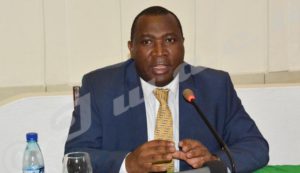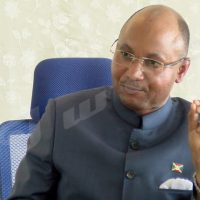During the presentation of the bill on 2018-2019 state budget at the National Assembly, Domitien Ndihokubwayo, Finance Minister has said the government contribution to the 2020 elections will move from BIF 12, 5 billion in 2018 to BIF 33, 2 billion for this 2018-2019 fiscal year.

Domitien Ndihokubwayo: “If we don’t work hard, austerity measures will be maintained”
“This rise is explained by the amount of BIF 8, 2 billion that was expected to be used in the 17 May constitutional referendum but which was not used and was therefore transferred to the contributions to 2020 elections as well as the revenue increase of BIF 12.5 billion,” he says adding that the government also expected to contribute BIF 12, 5 billion in 2018.
At the beginning of June 2018, Minister Domitien Ndihokubwayo said the total amount needed for 2020 elections is estimated at around BIF 70 billion. On 30 May, an amount of BIF 17 billion was already collected from government officials and other categories including legal and natural persons. Unemployed people are expected to start contributing by July.
In 2018-2019 fiscal year, Burundi government will have to use BIF 1,400 billion instead of BIF 1,388 billion used in 2018. MP Léopold Hakizimana raises his concerns about the current “austerity” situation. “Considering the budget amount to be used, it is obvious that we are still in austerity times like in previous years since 2016”, said MP Hakizimana before asking. when Burundi government is going to reduce its budget.
Domitien Ndihokubwayo says Burundi government is like an individual. “It has several expenses it has to meet. If we don’t work hard to increase the economic growth, austerity measures will be maintained. We have to use our own financial means given that we don’t have partners to support us”, he says.
Domitien Ndihokubwayo says the bill, which has been unanimously adopted, is in accordance with the new Constitution promulgated on 7 June and the East African Community Protocols. “The fiscal year starts on 1 July and ends on 30 June of the next year”, he says.



















 IWACU Open Data
IWACU Open Data

